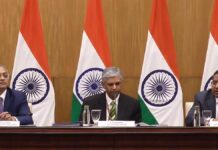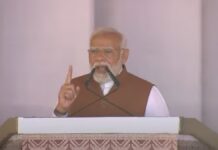X: @vivekbhavsar
Pakistan’s military courts are once again under international scrutiny after convicting 25 supporters of former Prime Minister Imran Khan for their alleged role in the May 9, 2023, riots. These trials, conducted behind closed doors, have raised concerns about judicial independence, human rights violations, and political repression.
Controversial Military Trials
Military courts in Pakistan were originally set up to handle terrorism-related cases, but their use against political activists and opposition supporters has sparked criticism. The convicted individuals have been sentenced to prison terms ranging from two to ten years, with no access to a civilian judicial appeal process. This lack of transparency has fueled accusations that these trials are part of a broader crackdown on the Pakistan Tehreek-e-Insaf (PTI) party.
International Condemnation
The United States (US) and the United Kingdom (UK) have strongly criticised these convictions, urging Pakistan to uphold democratic norms and the right to a fair trial. The U.S. State Department has called for greater judicial transparency, while British officials have warned against using military courts for politically motivated cases. International human rights organisations have also condemned these trials, arguing that they violate Pakistan’s constitutional and international legal commitments.

Political and Legal Implications
Legal experts argue that trying civilians in military courts violates Article 10-A of Pakistan’s Constitution, which guarantees the right to a fair and transparent trial. Furthermore, these trials undermine the credibility of Pakistan’s judiciary, reinforcing claims that the country is sliding towards authoritarian rule.
Politically, the move is seen as an attempt to weaken Imran Khan’s PTI party, which has faced intense persecution since his removal from power in 2022. Many of Khan’s key allies remain in jail, in exile, or have been forced to leave the party under pressure. With general elections approaching in 2025, the military’s role in suppressing political opposition raises questions about the fairness of the electoral process.
Impact on Pakistan’s Global Standing
Beyond its domestic impact, the crackdown could damage Pakistan’s diplomatic relations. The country is currently seeking economic aid from global institutions like the IMF and World Bank, and such actions may erode investor confidence. Moreover, Pakistan’s military has positioned itself as a stabilising force, but these trials highlight growing authoritarianism, which could lead to greater international isolation.
A Dangerous Precedent for Civil Liberties
The increasing use of military courts against political opponents sets a dangerous precedent. If left unchecked, such trials could be expanded to silence journalists, activists, and dissenters, further eroding civil liberties. Human rights advocates warn that this could push Pakistan towards a deeper crisis, where political opposition is criminalised, and the space for democratic engagement is diminished.
Pakistan’s reliance on military courts to suppress political opponents risks both internal unrest and international backlash. The government faces a crucial choice: uphold democratic norms and constitutional rights or continue down a path of increasing authoritarianism that could destabilise the country.
With the 2025 elections approaching, Pakistan’s leadership must decide whether it wants to restore democratic credibility or risk further alienation from its people and the world.
(The Author Vivek Bhavsar is the Editor-in-Chief of TheNews21 and he can be reached at vivekbhavsar70@gmail.com)








This blog is definitely rather handy since I’m at the moment creating an internet floral website – although I am only starting out therefore it’s really fairly small, nothing like this site. Can link to a few of the posts here as they are quite. Thanks much. Zoey Olsen
Hey there I am so grateful I found your website, I really
found you by error, while I was researching on Google for something else, Anyways I
am here now and would just like to say thanks a lot for
a incredible post and a all round thrilling blog (I also love the theme/design), I don’t have time
to go through it all at the minute but I have bookmarked it and also included your RSS feeds,
so when I have time I will be back to read a great
deal more, Please do keep up the excellent jo.
my web-site: nordvpn coupons inspiresensation
Very rapidly this website will be famous amid all blogging people, due
to it’s good articles or reviews
Here is my page … nordvpn coupons inspiresensation (t.co)
Hi! This post couldn’t be written any better! Reading through this post reminds me of my good old room mate! He always kept chatting about this. I will forward this article to him. Pretty sure he will have a good read. Many thanks for sharing!
nordvpn discount 350fairfax
I’d like to thank you for the efforts you’ve put
in penning this site. I am hoping to check out the same high-grade blog posts from you
later on as well. In truth, your creative writing abilities has encouraged
me to get my own blog now 😉
Hiya, I am really glad I have found this information. Nowadays bloggers publish only about gossips and web and this is really frustrating. A good site with exciting content, this is what I need. Thanks for keeping this web site, I will be visiting it. Do you do newsletters? Can’t find it.
Do you mind if I quote a few of your articles as long as I provide credit and sources back to your site? My blog is in the very same area of interest as yours and my visitors would really benefit from a lot of the information you provide here. Please let me know if this alright with you. Thanks!
I believe this website holds very superb indited content posts.
I loved as much as you will receive carried out right here. The sketch is tasteful, your authored subject matter stylish. nonetheless, you command get got an shakiness over that you wish be delivering the following. unwell unquestionably come more formerly again since exactly the same nearly a lot often inside case you shield this hike.
Hi my friend! I want to say that this post is amazing, nice written and include almost all significant infos. I would like to see more posts like this.
Hey there, I think your site might be having browser compatibility issues. When I look at your blog site in Ie, it looks fine but when opening in Internet Explorer, it has some overlapping. I just wanted to give you a quick heads up! Other then that, amazing blog!
I’m not that much of a online reader to be honest but your blogs really nice, keep it up! I’ll go ahead and bookmark your site to come back later. Cheers
how to get generic clomiphene can i get clomid without insurance where buy cheap clomiphene without prescription cost of cheap clomiphene online clomiphene or nolvadex for pct where can i buy generic clomid without dr prescription where can i buy clomiphene no prescription
The thoroughness in this piece is noteworthy.
Thanks on putting this up. It’s okay done.
zithromax medication – buy generic tindamax for sale buy metronidazole 200mg pill
order semaglutide for sale – buy rybelsus sale order cyproheptadine 4mg without prescription
order domperidone 10mg – cheap flexeril 15mg cyclobenzaprine 15mg price
good post.Ne’er knew this, appreciate it for letting me know.
augmentin over the counter – https://atbioinfo.com/ buy acillin sale
esomeprazole over the counter – https://anexamate.com/ esomeprazole 40mg canada
Definitely believe that which you stated. Your favorite reason appeared to be on the net the simplest thing to be aware of.
I say to you, I definitely get irked while people think
about worries that they just don’t know about. You managed to hit the nail upon the top and also defined out the whole thing without having side-effects ,
people can take a signal. Will probably be
back to get more. Thanks
Have a look at my web site – Eharmony special coupon code 2025
medex buy online – https://coumamide.com/ order losartan 25mg generic
It¦s really a great and useful piece of information. I¦m satisfied that you just shared this helpful information with us. Please stay us up to date like this. Thank you for sharing.
buy meloxicam sale – swelling how to buy meloxicam
I believe this web site contains some real wonderful info for everyone : D.
prednisone 10mg for sale – https://apreplson.com/ buy prednisone generic
Hi mates, how is everything, and what you want to say on the topic of this post, in my
view its in fact amazing in support of me.
My web site vpn
buy generic ed pills for sale – site generic ed pills
amoxil pill – comba moxi amoxicillin brand
forcan tablet – buy forcan tablets diflucan 200mg tablet
buy cenforce 50mg generic – on this site buy cenforce 50mg pills
cialis available in walgreens over counter?? – https://ciltadgn.com/ buy cialis no prescription overnight
buy ranitidine 150mg online cheap – https://aranitidine.com/# buy ranitidine pills for sale
cialis online without perscription – this generic tadalafil tablet or pill photo or shape
viagra cheap thailand – https://strongvpls.com/# viagra by mail order from canada
More posts like this would create the online elbow-room more useful. prednisone for asthma flare up
I couldn’t turn down commenting. Well written! order amoxicillin without prescription
Thanks for another great post. Where else could anybody get that kind of information in such an ideal means of writing?
I have a presentation next week, and I’m on the search for such information. https://tinyurl.com/2cab6g88 gamefly 3 month free trial
I couldn’t turn down commenting. Warmly written! https://prohnrg.com/product/lisinopril-5-mg/
This is the kind of content I get high on reading. https://aranitidine.com/fr/viagra-100mg-prix/
Today, I went to the beach with my children. I
found a sea shell and gave it to my 4 year old daughter and said “You can hear the ocean if you put this to your ear.” She put the shell to her ear and screamed.
There was a hermit crab inside and it pinched her ear.
She never wants to go back! LoL I know this is completely off topic but I had to tell someone!
https://tinyurl.com/2xsenm6a vpn definition
This is the kind of delivery I turn up helpful. https://ondactone.com/spironolactone/
When some one searches for his vital thing, therefore he/she wishes to be available that in detail,
thus that thing is maintained over here.
Hey there! I could have sworn I’ve been to this website before but after browsing through some
of the post I realized it’s new to me. Anyways, I’m definitely happy I
found it and I’ll be book-marking and checking back often!
Thanks on sharing. It’s first quality.
https://doxycyclinege.com/pro/spironolactone/
I’ll certainly bring to review more. http://www.underworldralinwood.ca/forums/member.php?action=profile&uid=487598
My brother suggested I might like this web site. He was once totally right. This put up truly made my day. You cann’t imagine just how a lot time I had spent for this info! Thanks!
I am incessantly thought about this, appreciate it for putting up.
Heya! I just wanted to ask if you ever have any problems with hackers? My last blog (wordpress) was hacked and I ended up losing many months of hard work due to no back up. Do you have any solutions to prevent hackers?
Great blog here! Additionally your site loads up very fast! What host are you the usage of? Can I am getting your affiliate link to your host? I want my site loaded up as fast as yours lol
dapagliflozin order – site buy dapagliflozin pills
xenical order online – https://asacostat.com/ brand xenical 60mg
I’ll certainly carry back to be familiar with more. http://www.kiripo.com/forum/member.php?action=profile&uid=1193136
naturally like your website but you have to check the spelling on several of your posts. Several of them are rife with spelling problems and I find it very troublesome to tell the truth nevertheless I’ll certainly come back again.
Throughout the grand design of things you actually receive a B+ with regard to effort and hard work. Exactly where you confused me was on your particulars. As they say, details make or break the argument.. And that couldn’t be much more true here. Having said that, permit me say to you precisely what did do the job. Your text can be quite convincing and that is possibly why I am making an effort in order to opine. I do not make it a regular habit of doing that. Next, although I can easily see a leaps in logic you make, I am not convinced of exactly how you seem to connect the details that make the final result. For now I will, no doubt yield to your issue however trust in the foreseeable future you link your facts much better.
Nice read, I just passed this onto a friend who was doing some research on that. And he actually bought me lunch because I found it for him smile So let me rephrase that: Thanks for lunch! “Life is a continual upgrade.” by J. Mark Wallace.
Simply a smiling visitant here to share the love (:, btw great layout.
Nice post. I was checking constantly this blog and I’m impressed! Very useful information particularly the last part 🙂 I care for such information a lot. I was seeking this particular info for a very long time. Thank you and good luck.
You can keep yourself and your stock close being cautious when buying panacea online. Some pharmaceutics websites function legally and provide convenience, solitariness, cost savings and safeguards as a replacement for purchasing medicines. buy in TerbinaPharmacy https://terbinafines.com/product/nizoral.html nizoral
You can protect yourself and your ancestors close being heedful when buying panacea online. Some pharmacopoeia websites function legally and provide convenience, solitariness, cost savings and safeguards over the extent of purchasing medicines. buy in TerbinaPharmacy https://terbinafines.com/product/haldol.html haldol
You can protect yourself and your stock by way of being heedful when buying prescription online. Some pharmacy websites function legally and put forward convenience, privacy, rate savings and safeguards to purchasing medicines. http://playbigbassrm.com/es/
More articles like this would frame the blogosphere richer.
Tham gia cộng đồng game thủ tại Go88 để trải nghiệm các trò chơi bài, poker phổ biến nhất hiện nay.
Đến với J88, bạn sẽ được trải nghiệm dịch vụ cá cược chuyên nghiệp cùng hàng ngàn sự kiện khuyến mãi độc quyền.
搭载智能站群程序,自动化搭建与管理,为SEO项目提供核心驱动力。站群程序
Hello There. I found your weblog the use of msn. This is a really well written article. I will make sure to bookmark it and return to learn more of your useful information. Thank you for the post. I will definitely comeback.
Hello! I know this is kind of off topic but I was wondering if you knew where I could locate a captcha plugin for my comment form? I’m using the same blog platform as yours and I’m having trouble finding one? Thanks a lot!
Tham gia cộng đồng game thủ tại Go88 để trải nghiệm các trò chơi bài, poker phổ biến nhất hiện nay.
搭载智能站群程序,自动化搭建与管理,为SEO项目提供核心驱动力。站群程序
I’d must test with you here. Which is not something I normally do! I enjoy reading a submit that will make people think. Additionally, thanks for allowing me to comment!
As a Newbie, I am constantly exploring online for articles that can benefit me. Thank you
Tham gia cộng đồng game thủ tại Go88 để trải nghiệm các trò chơi bài, poker phổ biến nhất hiện nay.
Với giao diện mượt mà và ưu đãi hấp dẫn, MM88 là lựa chọn lý tưởng cho các tín đồ giải trí trực tuyến.
Đến với J88, bạn sẽ được trải nghiệm dịch vụ cá cược chuyên nghiệp cùng hàng ngàn sự kiện khuyến mãi độc quyền.
I would like to thnkx for the efforts you have put in writing this blog. I am hoping the same high-grade blog post from you in the upcoming as well. In fact your creative writing abilities has inspired me to get my own blog now. Really the blogging is spreading its wings quickly. Your write up is a good example of it.
hello there and thank you for your info – I’ve certainly picked up something new from right here. I did however expertise a few technical issues using this site, as I experienced to reload the website many times previous to I could get it to load correctly. I had been wondering if your hosting is OK? Not that I am complaining, but slow loading instances times will sometimes affect your placement in google and could damage your high-quality score if ads and marketing with Adwords. Well I am adding this RSS to my e-mail and can look out for a lot more of your respective interesting content. Ensure that you update this again very soon..
Some truly interesting points you have written.Aided me a lot, just what I was searching for : D.
Great website! I am loving it!! Will be back later to read some more. I am taking your feeds also.
It’s in fact very complicated in this busy life to listen news
on Television, so I only use web for that reason, and take the latest news.
vpn https://www.highlandguides.com/
Can I just say what a relief to find someone who actually knows what theyre talking about on the internet. You definitely know how to bring an issue to light and make it important. More people need to read this and understand this side of the story. I cant believe youre not more popular because you definitely have the gift.
I enjoy your writing style really enjoying this website .
Outstanding post, you have pointed out some wonderful points, I besides think this s a very fantastic website.
bet mgm casino online casino betmgm play betmgm Utah
mcluck free bet online casino McLuck mcluck LA
Featuring Paris Hilton as a kind representative in the past and in busy wholesaler tables, wowvegas remains a top sweepstakes casino choice. It offers complimentary coins pro clowning ad lib coupled with the sensational way out to redeem prizes from Sweepstakes Coins.
Indulge in the glamour of high-stakes gaming from home. crowncoinscasino provides cryptocurrency options for fast transactions. Experience the rush and reap the rewards!
Sweet Bonanza is bursting at the seams with vibrant treats and explosive winning opportunities. Bonus sweet bonanza app round multipliers can send your winnings soaring. Taste the thrill!
Roam free with wins that shake the earth. buffalo slot machine near me features stacked pays, multiplier madness, and jackpot thunder. Your adventure awaits!
Want anonymous crypto gambling with huge multipliers? sweet bonanza stake has been delivering it for years. Jump in.
kings maxxwins Casino: Thrills without the risk. New users score 500 spins after $5 + up to $1,000 lossback protection. Discover why players choose us!